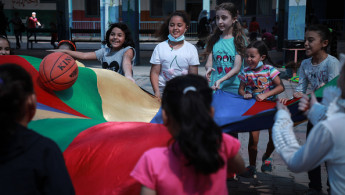UNRWA launches 'Gaza Summer Fun Weeks' for children after years of hiatus
After years of a hiatus, the UN Relief and Works Agency for Palestine Refugees (UNRWA) relaunched its "Gaza Summer Fun Weeks" (SFWs) on Monday in the besieged coastal enclave of the Gaza Strip to support children experiencing psychological issues.
From ages four to 14, around 120,000 children in 83 UNRWA-administered schools across the Gaza Strip will participate in the activities, according to a press statement issued by the UN agency.
UNRWA added that the event will last four weeks to include the most possible number of participants.
"Each summer camp's facilities will include climbing to trampolines, a beautiful castle and football field, as well as other recreational activities such as painting and handicrafts," the statement said.
"The current fun activities aim to provide entertainment programs for ctoorder to help them alleviate their psychological problems as a result of the instability in Gaza," Ben Majekodunmi, the Officer-in-Charge of UNRWA Affairs in Gaza, said to The New Arab.
"The SFWs are one of the Agency's responses and interventions to help alleviate the psychological effects of repeated cycles of conflict and the devastating living conditions resulting from 15 years of blockade," Majekodunmi further elaborated.
"Gaza's children have the right to live in peace, educate and play in a safe and stimulating environment like all children in the world," he stressed.
According to a survey conducted by UNRWA, the incidence of war-related trauma has increased with about 42 per cent of surveyed UNRWA first-grade school children in Gaza in need of psychosocial support.
Even nine months later, 35 per cent of these children were still suffering from reactions to trauma, the survey noted.
For her part, Jamila Hassan, a 13-year-old girl, expressed her happiness to be able to join the SFWs. "I have a good opportunity to meet new friends at the camp and learn more about my talents," she said to The New Arab.
"Here, all of us can play and have fun amid a wonderful atmosphere," she added.
"Such camps are a way to reintegrate children into society after a long year of study and the wars they lived through, which caused isolation as a result of successive events, and schools are the safe place in the Strip in the eyes of children," Ibrahim Hassan, Jamila's father, said to The New Arab.
"Most of Gaza's children have been suffering from the consequences of the Israeli war (…) and we (parents) do not have the correct methods to help them," he added.
Israel imposed a tight blockade on the Gaza Strip in June 2007 after fighters of the Islamist Hamas movement took control of the densely populated enclave. Since then, both Israel and Egypt have continued to severely restrict the flow of people and materials to and from Gaza.
Britain-based Save the Children said that four out of five children in Gaza suffer from emotional distress, warning that Gazan children's mental health continues to deteriorate.
Since 2018, the number of those reporting symptoms of "depression, grief, and fear," had risen from 55 per cent to 80 per cent, the organization reported.





 Follow the Middle East's top stories in English at The New Arab on Google News
Follow the Middle East's top stories in English at The New Arab on Google News


